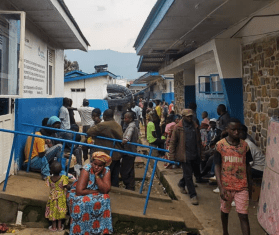Osama Abu Laban, a father in Gaza and a Doctors Without Borders/Médecins Sans Frontières (MSF) colleague, knows this desperation firsthand—as well as the tragedies that follow. His 14-year-old son was killed in a strike while he was getting water for his family in Beit Hanoun. Afterwards, Abu Laban and his family fled to Deir al-Balah, central Gaza, in hopes to find more security. A year later, in November 2024, his 17-year-old daughter Rahaf suffocated to death in a crowd while she was trying to get bread. Here, Abu Laban describes the traumatic events that led to the death of his daughter.
I spent exactly 20 days without bread in Deir al-Balah. At that time, all I could hope for was a single loaf of bread. We had to go [to the bakery] very early, at 4:00 a.m. I waited in line until 6:00 p.m. Honestly, I was exhausted. I wasn't able to handle it. My leg was injured, which was making it hard for me to stand for a long time.
It was incredibly difficult for us, to the point that my children and I would eat rotten flour. My daughter, Rahaf, would eat the bread and then she would throw up. She couldn’t stomach that bread and I couldn't provide anything better. But bread was just the beginning of our struggles.
I remember Rahaf told me, “Dad, I want to go [to the bakery] this time. For you, going to the bakery means risking your life. If you were as tough as others, I’d say go ahead. But I know you, you don’t like these situations. You don’t like crowded places.”
Nevertheless, I went to the bakery and stood in line for about 20 minutes.

While I was in line, my wife came running to me and said, “Hurry, hurry, Rahaf followed you.”
Then two young men asked me to help them, saying that there was chaos where the women were [standing]. Some women fell.
“We think two girls have fainted,” they said. “It seems like they’re suffocating.”
I picked up the first girl and handed her to the young man who was talking to me. Then I saw the second girl. Her face turned toward me as I grabbed her legs. I saw her face and realized it was my daughter.
In the car, I tried to wake her up in every possible way. I know basic first aid. I just thought maybe if we reached the hospital, they could bring her back.
But at the hospital, the doctor told me there was nothing they could do. That was the moment I broke down and lost control. "Your brother is gone; don’t follow him," I told her. "Don’t leave me broken."
She was my joy, my spirit, my hope.

"We dread nightfall"
The war on Gaza, as told through the voices of MSF staff and patients.
Read more



